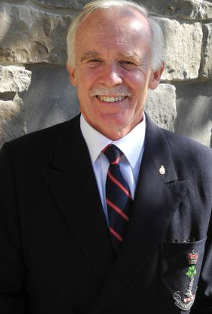
A native of Montreal, John Leggat entered RMC as a Reserve Entry Training Plan (RETP) cadet in 1967, graduating with first-class honours in Mechanical Engineering in 1971. While a cadet at RMC, he participated in varsity tennis, played water polo and lacrosse and was a member of the choir. In his fourth year, he was Cadet Wing Communications Officer. He then studied aeroacoustics at the University of British Columbia (UBC), graduating with an MSc in 1973 and a PhD in 1976.
Leggat served as a Defence Scientist at the Defence Research Establishment Atlantic in Halifax, one of five Department of National Defence (DND) research facilities. There he undertook and led research in hydro-acoustics and hydro-mechanics. He became a recognized authority in underwater noise and played a leading role in quieting the ships and submarines of the RCN. During that time, he was also an Adjunct Professor in engineering physics and mechanical engineering at the Technical University of Nova Scotia, now part of Dalhousie University.
Leggat continued his service with the Reserves until 2000. As a Lieutenant-Colonel, he commanded 33 Service Battalion, was Deputy Chief of Staff at Land Force Atlantic Area HQ , and Deputy Commander of the Western Nova Scotia Militia District. He attended National Defence College in 1986-87. In 1989, he was appointed Director General of Research and Development Operations at NDHQ and moved to Ottawa in 1990. In 1993 he became Director General of the Defence Research Establishment in Ottawa.
Leggat was appointed Chief of Research and Development for DND in 1997 and became the driving force and founding CEO of Defence Research and Development Canada (DRDC), a Special Operating Agency of DND, providing national leadership in defence science to the Canadian Forces and DND. Coincidently, Leggat was Director, Reserves from 1992 until 1998.
As Director Reserves, he was an innovative champion of Canada's Reservists, initiating the "Get Well" program to improve and equalize pay and allowances for Reservists. He also worked to retain the RETP at RMC and expand other educational opportunities for Reservists and generally enhanced their profile within the Canadian Forces.
Leggat became Assistant Deputy Minister (Science and Technology) at DND in 2000. He worked closely with the Principal and Deans at RMC to provide a mechanism for RMC faculty members to compete for and receive the Natural Sciences and Engineering Research Council of Canada (NSERC) grants. Under his guidance, the DRDC Centre for Security Science was created as a joint endeavour between DRDC and Public Safety Canada.
During his career, Leggat has served on about 30 scientific advisory committees and boards and received numerous awards and honours. He was the Canadian representative for the NATO Research and Technology Organization for many years, and led the team that wrote the current NATO Research and Technology Strategy. He was awarded the Association of Professional Executives of the Public Service of Canada Leadership Award for his creation of DRDC. In 2000, he was awarded the Robert W. Angus Medal by the Canadian Society of Mechanical Engineering. He was elected an Honorary Member of the Engineering Institute of Canada in 2002.
From 2005 to 2013, Leggat was a consultant and Senior Advisor with CFN Consultants in Ottawa. In 2007, he was awarded the Professional Engineers of Ontario Engineering Medal. In 2008, he was elected President of the Canadian Academy of Engineering and assumed the Presidency of the International Council of Academies of Engineering and Technological Sciences.
In 1999-2000, Leggatt was President of the RMC Club.
Plaque inscription:
Aero/Hydro Acoustics scientist, DND and NATO Research leader, Reservists champion